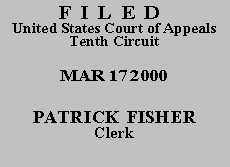 UNITED STATES COURT OF APPEALS
UNITED STATES COURT OF APPEALS
 UNITED STATES COURT OF APPEALS
UNITED STATES COURT OF APPEALS
TENTH CIRCUIT
| MARCUS R. MILLER, | |
| v. | No. 99-5171 |
| KENNETH KLINGLER, | (D.C. No. 97-CR-288-H)
(N.D. Okla.) |
ORDER AND JUDGMENT(*)
Before BALDOCK, HENRY, and LUCERO, Circuit Judges.(**)
Petitioner Marcus R. Miller, proceeding pro se, appeals the district court's denial of his petition for a writ of habeas corpus under 28 U.S.C. § 2254. The district court granted Petitioner leave to proceed in forma pauperis, see 28 U.S.C. § 1915(a)(1), but denied his application for a certificate of appealability. See 28 U.S.C. § 2253(c)(2). We exercise jurisdiction pursuant to 28 U.S.C. § 2253. We deny Petitioner's application for a certificate of appealability and dismiss Petitioner's appeal.
I.
Petitioner was convicted in Tulsa County, Oklahoma District Court on February 5-7, 1990 of assault and battery on a police officer after a conflict with a Tulsa County Sheriff's Deputy. The state court instructed the jury that Petitioner was "presumed to be not guilty," rather than "presumed to be innocent." On direct appeal, the Oklahoma Court of Criminal Appeals affirmed. Miller v. State, No. F 90-842 (Okla. Crim. App. Sept. 28, 1993) (unpublished). Petitioner subsequently sought post-conviction relief in the state court, arguing that (1) the trial court misinstructed the jury on the presumption of innocence in violation of Flores v. State, 896 P.2d 558, 562 (Okla. Crim. App. 1995), (2) he received ineffective assistance of trial counsel because counsel failed to object to the jury instructions, and (3) he received ineffective assistance of appellate counsel for failing to raise the Flores issue on direct appeal. The state court denied Petitioner's application for post-conviction relief, finding that the claims were procedurally barred because Petitioner had not raised them on direct appeal, and that he had received effective assistance of appellate counsel. The Oklahoma Court of Criminal Appeals again affirmed. Miller v. State, No. PC 95-908 (Okla. Crim. App. Mar. 11, 1996) (unpublished).
In the United States District Court for the Northern District of Oklahoma, Petitioner filed a petition for a writ of habeas corpus under 28 U.S.C. § 2254, raising the same claims he presented to the state court in his application for post-conviction relief. The district court denied the petition, ruling that the Flores and ineffective assistance of trial counsel issues were procedurally barred and that the ineffective assistance of appellate counsel claim was without merit. Petitioner appeals, arguing that the district court erred in denying his petition.
II.
In Sherrill v. Hargett, 184 F.3d 1172 (10th Cir.), cert. denied, 120 S. Ct. 507 (1999), this court considered and discredited claims identical to Petitioner's. Accordingly, we agree with the district court that Petitioner's Flores and ineffective assistance of trial counsel claims are procedurally barred, and that Petitioner's ineffective assistance of appellate counsel claim is without merit. Therefore, we deny Petitioner's request for a certificate of appealability and dismiss his appeal.
CERTIFICATE OF APPEALABILITY DENIED; APPEAL DISMISSED.
Entered for the Court,
Bobby R. Baldock
Circuit Judge
*. This order and judgment is not binding precedent, except under the doctrines of law of the case, res judicata, and collateral estoppel. The court generally disfavors the citation of orders and judgments; nevertheless, an order and judgment may be cited under the terms and conditions of 10th Cir. R. 36.3.
**. After examining the briefs and appellate record, the panel has determined unanimously that oral argument would not materially assist the determination of this appeal. See Fed. R. App. P. 34(a)(2)(c); 10th Cir. R. 34.1(G). This case is therefore ordered submitted without oral argument.